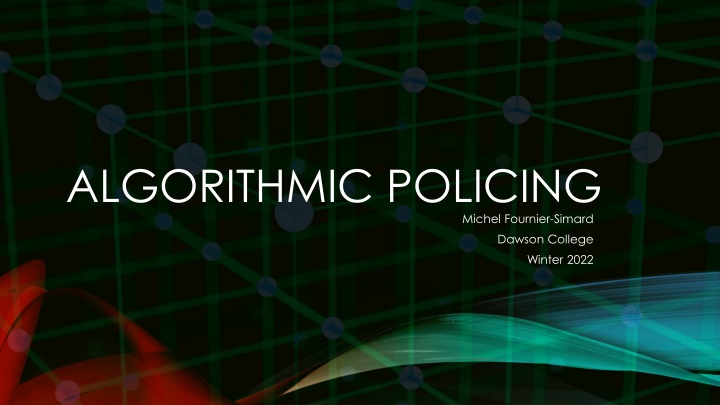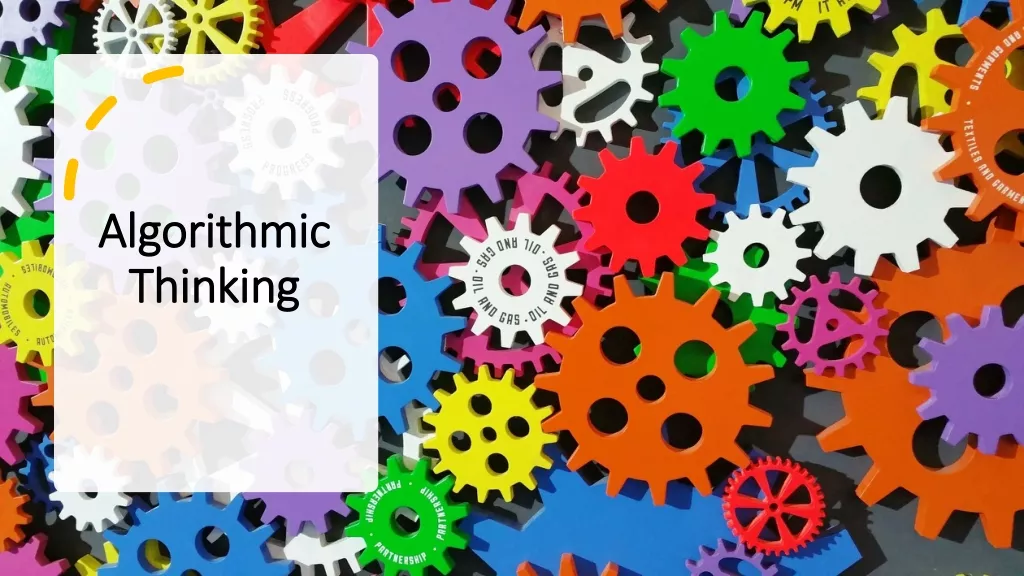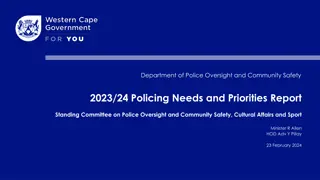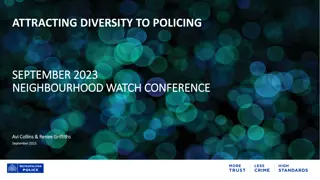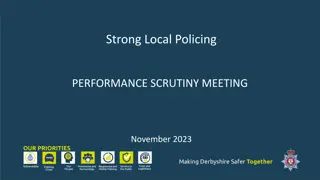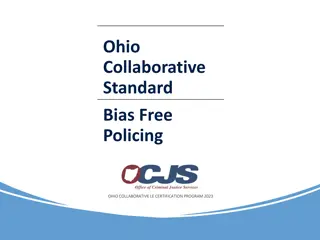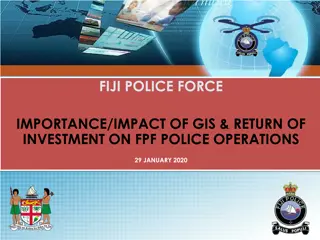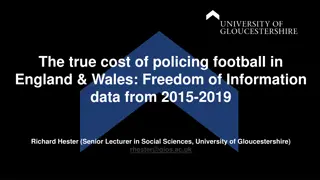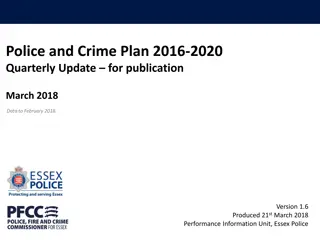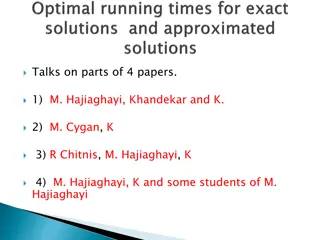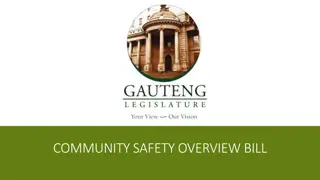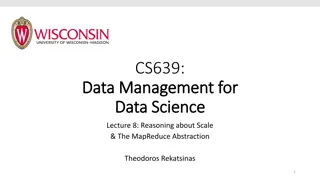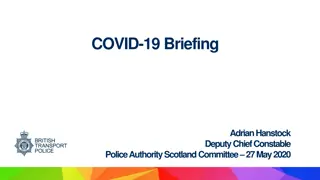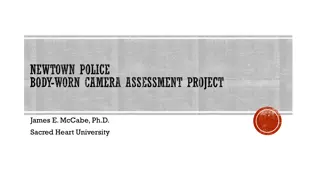ALGORITHMIC POLICING
The use of algorithms and AI in policing, exploring their potential benefits, shortcomings, and ethical implications in Canada. Discover how everyday AI is integrated into Canadian policing practices and the evolving challenges related to privacy and police power with the advancement of technology.
Download Presentation

Please find below an Image/Link to download the presentation.
The content on the website is provided AS IS for your information and personal use only. It may not be sold, licensed, or shared on other websites without obtaining consent from the author.If you encounter any issues during the download, it is possible that the publisher has removed the file from their server.
You are allowed to download the files provided on this website for personal or commercial use, subject to the condition that they are used lawfully. All files are the property of their respective owners.
The content on the website is provided AS IS for your information and personal use only. It may not be sold, licensed, or shared on other websites without obtaining consent from the author.
E N D
Presentation Transcript
ALGORITHMIC POLICING Michel Fournier-Simard Dawson College Winter 2022
ALGORITHMIC POLICING What is AI ? What is Policing ? What is Algorithmic Policing? Algorithmic Policing in Canada Policy Solutions
WHAT DO YOU KNOW ABOUT AI ? Have algorithms impacted you in the last 24h? The good The not so good ? AI & Power
WHAT IS AI Artificial = the use of computers, the automatization Intelligence = most Human behaviors: learning, perception, reasoning, using language, counting, predicting, problem solving. AI: Using computers to mimic human decision-making & problem solving capacities Source: B.J. Copeland, Britannica Algorithms: a series of instructions given to a computer to transform data into useful information / decisions
WHAT IS POLICING The armed arm of the State Weber s definition of the State The capacity to use force (Brodeur) Police discretion and the centrality of decision making (Monjardet) How does AI influence this capacity - this power ? Also, what is force?
ALGORITHMIC POLICING The use of algorithms and AI to enhance and potentially transform police decision-making practices Use mass data to inform daily operations Potential benefits: + safety + efficient + proactive - bias + accountability Potential downfal + bias - accountability - mass surveillance - privacy - civil rights
EVERYDAY AI IN CANADIAN POLICING Ai is used everyday for clerical effectiveness Automatic transcription Scheduling = more officers in the streets, preventing crime and doing community policing But what about other, more controversial Police uses of AI? What are the big issues here?
PRIVACY Traditional limits to police power Resources limitations (time, manpower, cost) Public oversight of the police AI allows gathering, processing, and analyzing an amount of data that would have been unthinkable just a few years ago, including vast amount of private citizen information Dragnet surveillance: widening the police database inclusion trigger mechanism Inexpensive, and behind screens
OBJECT RECOGNITION SOFTWARE (1) Automatic Licence Plate Readers +10 years of AI in Canadian policing SPVM: among the firsts in Canada The industry leader: Genetec (Montreal) More efficient Bias: no more random road stops? Privacy You have a car and live in Quebec? The SPVM likely has data on where your car was in the last five years. Images taken from Genetec Autovu promotional material
OBJECT RECOGNITION SOFTWARE (2) Winter 2020 Clearview AI scandal 48 Clients including the RCMP, TPS, VPD, etc. Social Media databases AI in policing studently becomes a scary prospect for the general public Facial Recognition in Canadian Policing Since 2014 in Calgary, Toronto, etc Despite over 4% error rates! Since 2020 in Quebec, S ret du Qu bec Mugshot database, now 0.08% error rates T Smith, OneZero.medium
BIAS Algorithms are the product of the data they are fed (which might be biased), and the biases of their creators (intentional or not). AI makes mistakes, but not all have the same consequences A bad Netflix recommendation Biased credit ratings Bail hearing & MachineBias Reports Blind reverence to AI as a neutral fix-all solution to social problems risks reproducing existing biases with the imprimatur of impartiality
PREDICTIVE POLICING The use of historical data to forecast where crimes are likely to occur or by whom to deter them before they happen Historical data, especially in a policing context, might be particularly biased Can lead to the continued overpolicing of marginal communities with the apparance of algorithmic impartiality
PERSON-BASED PP The Chicago PD Strategic Subject list LAPD PredPol Fiasco Person-Based Applications for good in Saskatchewan Missing children Privacy implications Collaboration with Universities to legitimize surveillance
VANCOUVER POLICE 2019-202 Placed-Based Predictive Policing that impacts daily policing practices Deep learning / Machine learning. By Definition, this means even the VPD does not know what is taken into account to make predictions Adoption process with limited overseight Took preliminary (unconvincing) data as proof of concept Dealing with potential biases Excluded the DTES Only includes crime datapoints reported by citizens, but what about their biases? Re: the central park birdwatcher incident
POLICY ISSUES Traditional accountability mechanisms (police boards, resource limitation) is not enough Declarations and Ethical AI are strategies used by actors in the industry to avoid regulation...
POLICY SOLUTIONS Governmental action Give money now, regulate later 2019 TBSC Directives on Automated Decision-Making (but Chinook) Privacy Commissioners Ontario Privacy Commissioner Assessment on add-on software (2017) Local politicians Summer 2020 Commission de la S curit Publique de Montr al & ALPRs Toronto June 2020 City Council, direct impacts on BWC adoption in July 2020 Halifax Police Board: keeping the police on their toes
TO CONCLUDE SHARED POLICY CONCERNS Algorithmic policing is not developing in a vacuum Healthcare -- privacy of data Credit score biased decision-making -- predictive policing Social media regulation & police dragnet surveillance practice But your doctor, banker, or Instagram Influencer cannot arrest you
TO CONCLUDE (BIS) PARTICULARITIES OF POLICING Algorithmic Policing cannot be treated as just another AI Policy field Policing as a unique government responsibility. One which enables an institution to surveil and use coercive force to restrain civil liberties AI can completely transform how our societies are policed, the invasiveness of which cannot be understated. This is fundamentally a democratic question. At its core: the power balance between citizens and their police.
ALGORITHMIC POLICING IN A DEMOCRATIC CONTEXT What are the big issues to consider ? What forms of algorithmic policing are in use in Canada? What are governments doing ?
